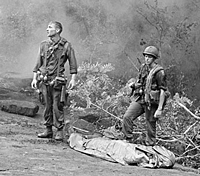|
Digital History>Topics>Historiography
Why was the United States in Vietnam?
Digital
History TOPIC ID 110
 During the Spring of 1965, shortly after President Lyndon Johnson initiated a policy of bombing North Vietnam and stepping up ground action in the South, Time magazine published an editorial defending the President's moves. Entitled "Viet Nam: The Right War at the Right Time," the essay appeared in response to a chorus of criticism that erupted on college campuses, objecting to the war on pragmatic grounds - that the United States could not win or need not win in order to safeguard its interests - and for ethical reasons. During the Spring of 1965, shortly after President Lyndon Johnson initiated a policy of bombing North Vietnam and stepping up ground action in the South, Time magazine published an editorial defending the President's moves. Entitled "Viet Nam: The Right War at the Right Time," the essay appeared in response to a chorus of criticism that erupted on college campuses, objecting to the war on pragmatic grounds - that the United States could not win or need not win in order to safeguard its interests - and for ethical reasons.
Time asserted that the United States was morally right to intervene in the war because it was necessary to contain the expansion of the Sino-Soviet bloc; to fulfill American treaty obligations (including bilateral agreements with South Vietnam and the terms of the Southeast Asia Treaty Organization (SEATO) pact); to protect a pro-western country from armed totalitarian attack; and to defend American national honor and credibility. Invoking the so-called "domino theory," which held that the loss of South Vietnam would lead inevitably to the loss of neighboring countries, Time described South Vietnam as a vital buffer state necessary to halt communist expansion.
It called North Vietnam a "Peking satellite," and claimed that after winning all of Vietnam, communists "inevitably...would seek domination of the whole area." Since the early nineteenth century, Time said, the United States had grown to a major Pacific maritime power: "To surrender the Pacific to China now makes no more sense than surrendering it to Imperial Japan would have in 1941."
The war's critics rejected these arguments, insisting that American involvement in Vietnam was not justified either on the grounds of vital national interest or strong moral imperative. Where Time claimed that American intervention was justified because the conflict had been caused by foreign aggression from North Vietnam, anti-war critics maintained that the struggle in Vietnam was essentially a civil war in which the United States had no right to intervene.
They noted that Vietnam had been one country until it was temporarily divided by the Geneva Accords of 1954, which provided for general elections in 1956 to reunify the country and that it was the South Vietnamese President, Ngo Dinh Diem, who refused to honor that agreement. In addition, opponents of the war rejected that notion that the United States had any treaty obligation to defend South Vietnam, noting that back in 1955, when the SEATO pact was approved, Secretary of State John Foster Dulles informed Congress that in the event of communist subversion "all we have is an undertaking to consult together as to what to do about it."
The war's critics also rejected the notion that the war was necessary to halt Chinese expansionism, noting that Vietnamese history revealed centuries of bitter enmity between Vietnam and China. In contrast to the war's supporters, anti-war protesters did not regard the communist world as a monolithic bloc or (in Time's words) as "an international aggressive movement," and argued that the opposition to the South Vietnamese government was overwhelming indigenous, coming from citizens of South Vietnam.
Opponents of the war viewed the Viet Cong as a uneasy coalition of communists and nationalists and social revolutionaries seeking land reform, reunification, and expulsion of colonial powers from their land. Anti-war protests warned prophetically that the strength of Vietnamese nationalism - one of the strongest currents in modern Vietnamese history - would lead the opponents of the Saigon government to accept sacrifice and absorb losses far greater than the American public would tolerate.
Time and its critics also clashed over the question of whether the United States could successfully fight for democracy by supporting an undemocratic regime in South Vietnam. Time said "yes": "A democratic regime is hardly possible in a war-torn country without much democratic tradition," the magazine argued. "What the critics fail to admit is that even a bad non-Communist regime is usually subject to change, but once a Communist regime is established, it is virtually irreversible."
The war's critics said "no," and denounced American military tactics in Vietnam - such as the use of napalm (jellied gasoline), assassination, and defoliants - as immoral.
Questions to think about:
1. Evaluate the arguments advanced in favor and against American involvement in the Vietnam War.
2. Which arguments do you find most compelling?
|
